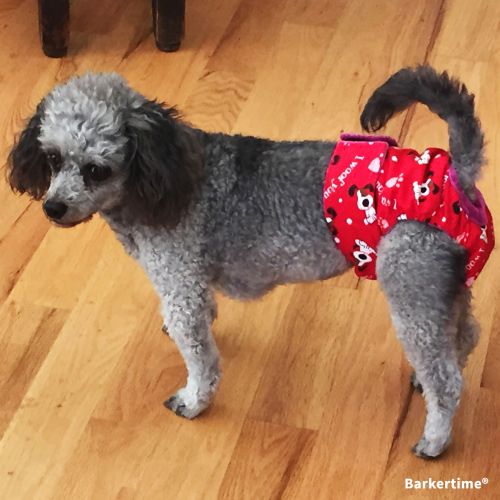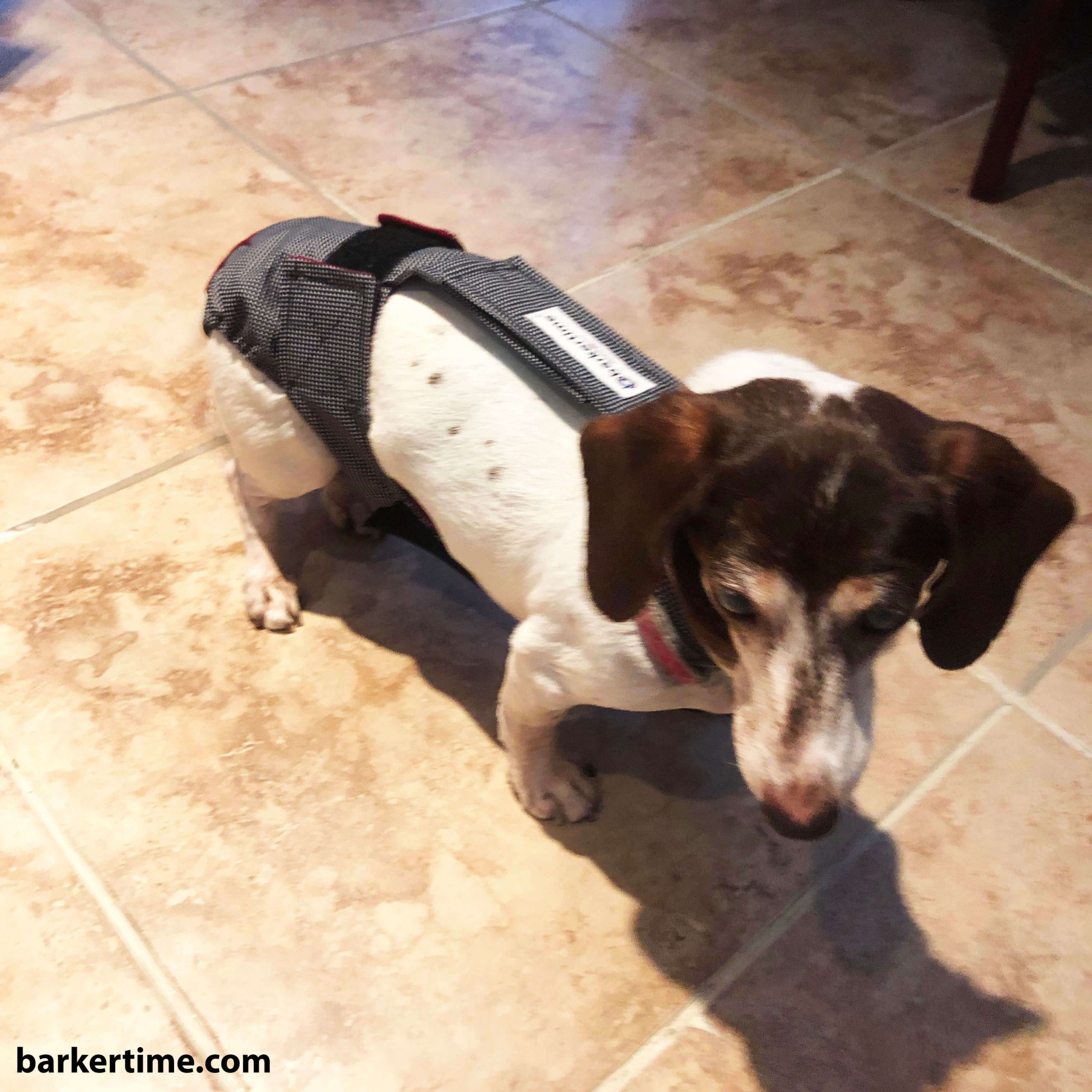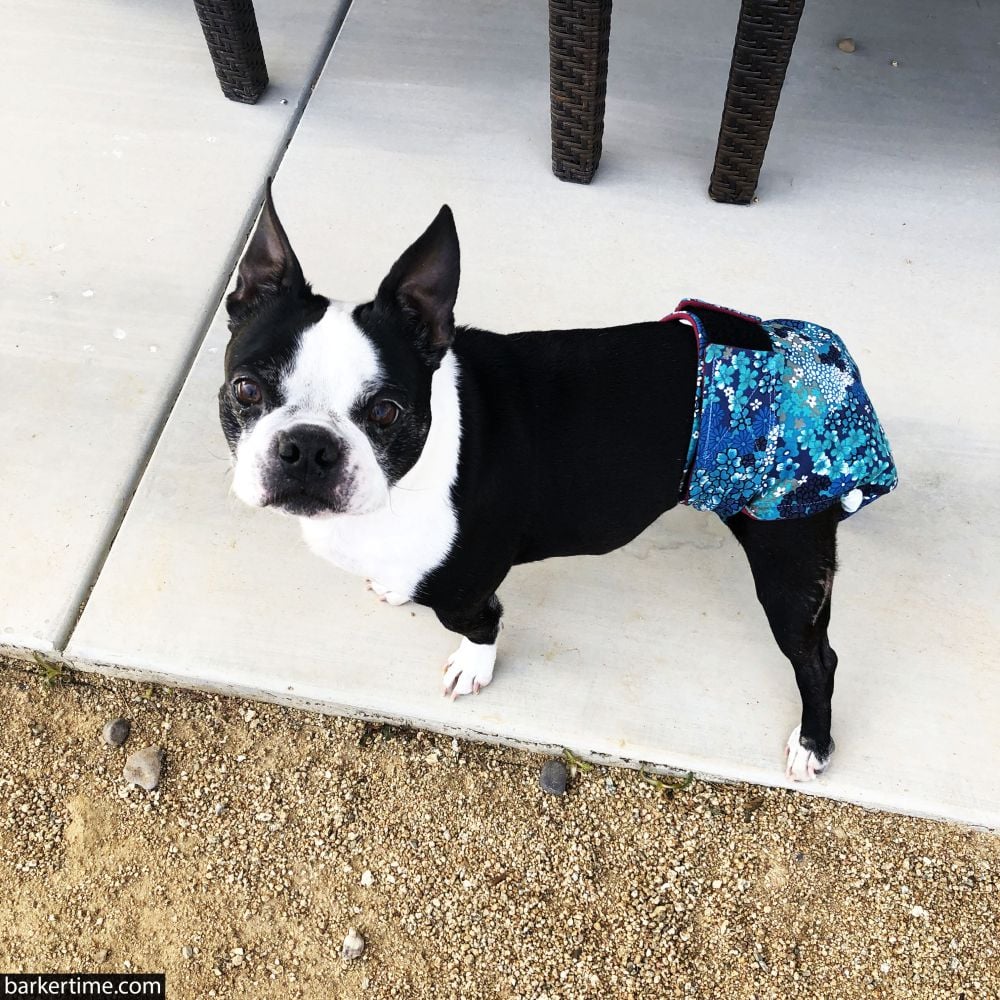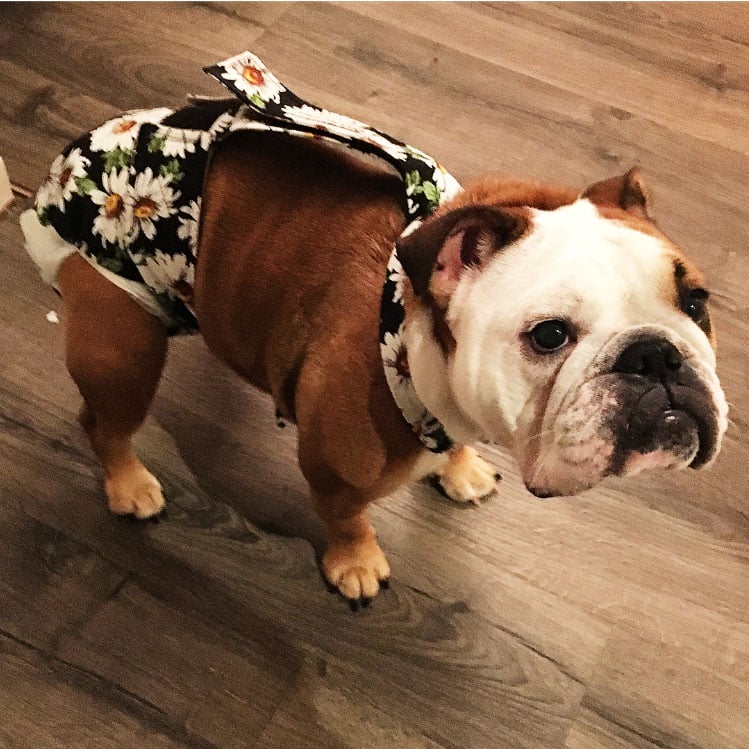Your cart is currently empty!
How diapers and belly bands can improve the quality of your dog’s life (and yours, too)
Diapering a dog or cat is no longer a foreign concept to many pet parents. Upon recommendation of your veterinarian or another pet parent, you may find that your dog needs to wear a diaper or belly band. Diapers and belly bands are useful during all stages of your dog’s life, from the puppy stage, to adulthood, to seniority. They are small investments that can greatly improve the quality of your dog’s life, as well as protect your home, furniture and your dog’s living environment from unwanted “messes”. There are a variety of reasons, both medical and behavioral, why your dog needs the help of diapers or belly bands. Here is what you need to know when it’s time to diaper your furbaby:
To help house-train a new puppy
Potty-training is a comprehensive process that requires a lot of learning and adapting, both for you and for your puppy. If you decide to use diapers on your dog, it is most useful when your dog already understands the concept of peeing and pooping outside the living area. Diapering your dog cannot and will not replace the basics of house-training, but will certainly help your dog become house-trained faster. Many pet owners (especially first time pet parents) find that putting their furbaby in diapers helps when he or she goes potty outside (or in a designated area) most of the times and only has accidents occasionally in the house. Wearing diapers or belly bands will inhibit peeing, so it reminds the dog that he or she is not supposed to “go” while in the house. Remember, though, to remove the diapers and take your puppy outside to potty every now and then!
Your dog has excitement urination
Your dog is perfectly house-trained, he knows exactly to go outside to potty and never pees inside. But you may find that whenever he is excited (during playtime or when greeting you back from work), he pees “his pants” without even squatting or lifting his leg. This urination behavior is normal and usually seen as simple immaturiy, which most dogs grow out of when they reach adolescence and develop control of the bladder. With a pair of diapers or belly bands on your dog, you’ll be able to protect your floor, furniture and more often than not, your feet (yes, it happens to us and many pet owners!), from getting peed on by your dog who is just excited to see you 🙂
Your dog has submissive urination
Submissive urination occurs when your dog urinates because he or she feels submissive or intimidated by a pack leader. In your dog’s eyes, you (or a bigger dog!) are the pack leader, so you may find that your dog produces dribbles of urine when interacting with you. Dogs do this as a way to show respect and social appeasement in the canine hierarchy. You should not scold your dog for urinating submissively, as that will perpetuate the problem and your dog will become even more submissive. Most of the times, your dog will gain confidence and outgrow the submissive urination behavior over time. In this case, use diapers or belly bands as part of the house-training process for your dog. If the peeing continues after a year or so, consult with a veterinarian to make sure there are not any underlying medical problems.
Your dog starts lifting his leg and marking around the house
Like humans, dogs are social animals that always feel the need to communicate with one another. One way they communicate is through urination. A dog uses urine marking to claim territory, which is his or her way of saying “I’ve been here!”. The little dribbles of your dog’s urine contain pheromones that tell another dog about the marker’s age, gender and status within their packs. Male dogs (especially those not yet neutered) tend to mark more often to establish dominance in their canine hierarchy. So, don’t be surprised if your male dog who is perfectly house-trained starts to lift his leg around the house and spoil your furniture when you bring home a new puppy who happens to also be a male. With diapers and belly bands inhibiting the peeing of your dog, you can help him realize that he is not supposed to lift his leg while protecting your furniture and objects around the house.
Your female dog goes into heat
Female dogs come into their first heat cycle around 6 months of age (or 12-18 months old for large breeds). The estrous cycle, or heat cycle, lasts for about 2 weeks. When a female dog goes into “season”, her vulva will be swollen and discharge blood. Pet parents of female dogs that are not yet spayed and many breeders use diapers as an effective way to prevent unwanted pregnancy and contain the bleeding for easy clean-up. You might want to use a feminine pad, or a reusable liner, inside your doggie diapers, so you can just swap out the soiled liner for a clean one. The heat cycle happens twice a year, so with a washable doggie diaper, you can save it for later when your dog goes into heat again.
Your dog is getting old and becoming incontinent
Many pet parents discover that not only puppies, but as their dogs age, they may again be perfect candidates for diapers and belly bands. For medical reasons, elderly dogs gradually lose control of the bladder and soil the house with urine (urinary incontinence), and sometimes feces (fecal incontinence). Some common medical conditions that cause incontinence include hormonal imbalance, urinary tract infections (UTI), weak bladder sphincter tone, age-related senility, and spine-related injuries or degeneration. If your dog shows signs of incontinence, consult a veterinarian so your dog can get diagnosed and treated. With diapers and belly bands, urinary incontinence and fecal incontinence can absolutely be managed, so your dog, no matter how “senior” he or she may be, can still lead healthy, happy and productive lives.
We hope this helps you understand how diapers and belly bands can help improve the quality of your dog’s life and hopefully, yours, as well. Please let us know in the comment what you think or what else you would like to learn more about.











Thank you for these brief yet comprehensive explanations of why dogs do the things dogs do. Kudos
Thank you for this posting. We have a 13.5 yr old female Shih-Tzu that is on seizure meds & has a heart murmur that’s getting worse. We have been watching her go downhill for a couple of yrs, & it’s heartbreaking, but also know it’s a part of life. We’re expecting incontinence at some point, & recently got new carpeting that is “life & pet proof”, but still don’t want a lot of urine on it, so I’ve been researching doggy diapers, & this has been most helpful for us, thank you.
My male bernese, 6 years old has wobblers. He recently had a uti and is now dribbling at times. He is embarrassed when this happens. Would your belly band be the right product? Is it washable or disposable?